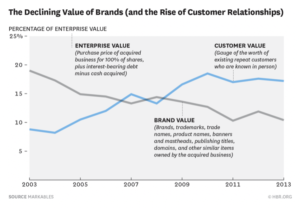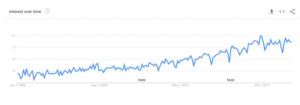Branding and customer experience are complicated in an industry where customers don’t have a choice in their water and wastewater service provider. Historically, water utilities focused on protecting public health and the environment, which are important to the health and vitality of a community. But water utilities are more than environmental and public health entities; they are also businesses. Branding and customer experience are business strategies that build trust with customers. Water is the essential element for life and trust is the essential element required to meet the challenges of funding gaps, workforce gaps, and the threat of water quality issues such as lead, PFAS, etc. As an industry thought leader, George Hawkins, states, “Customers do have a choice. They can choose to support you or to fight you.” The latter can be costly across multiple fronts.
A few years ago, some researchers set out to determine the value of “brand” vs. “customer experience,” which is a major fulcrum point of all business right now. Their research was around assets within merger deals, and they found that as the value of conventional “brand” declined, the value of your relationships with customers was increasing:

These results aren’t surprising. Customer experience has been a significant business topic over the last decade. Look at its general Google search history volume since 2004:

Well, now we’re about to hit the next wave of customer experience, especially in the water world. Artificial Intelligence (AI) is coming. Deemed by The New Yorker as “compressing the Industrial Revolution into the lifespan of a beagle,” AI is already starting to be a game-changer in multiple industries. Water is no different. Smart water management is one use case, as is the idea of “intelligent water.” Productivity, efficiency, and safety are all poised to improve, and with that comes the rise of customer experience.
As Water Briefing notes:
AI has the potential to predict and determine any number of responses to given challenges on water and sewerage networks as well as the treatment works. This will truly put the customer at the heart of all decision making and transform performance. In an era where skilled staff will become increasingly harder to recruit, use of intelligent sophisticated solutions will be essential to maintain increasing societal demands.
Talent management AND customer experience? Indeed!
Master Meter Inc. is entering the automated game too. We have a new technology called “Just Ask Alexa” which is a new technology we’ve rolled out for simplified engagement with both the My Water Advisor app and utility-level consumption data. We’ve been thinking more and more recently about this idea of “infobesity,” i.e., information overload. We’re constantly bombarded by information all day, and the path through all that noise is a simplification of product. With this in mind, we developed “Just Ask Alexa.”
Here are some of the questions or ideas you can “Just Ask Alexa:”
- How much do I owe so far this month?
- Why is my water bill so high?
- Did I have any leaks in the last 30 days?
- How do I compare to my neighbors?
- What will my estimated water bill be this month?
- Can you email me my latest consumption report?
See how the ease of use here is designed to boost the experience that our customers have with their water data? Yep. We’re continually trying to think like one of Silicon Valley’s most-respected female VCs, who said modern companies “have to focus on delivering an amazing experience.” Your customers coming back for more is what drives growth, and technology is a tremendous peer in helping that to happen. In the era of AI, capitalizing on customer experience will be an even greater gift for our industry. Improving customer experience not only builds a strong business case for water utilities but also earns the public trust and support necessary to build and maintain more resilient water systems. More resilient and sustainable water systems are essential to public health and environmental quality. Customer experience ends up creating a win-win situation for water utilities and the communities they serve.

